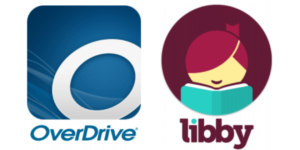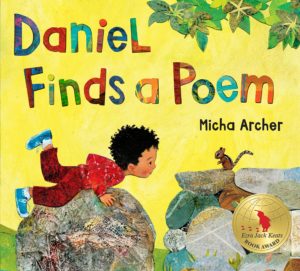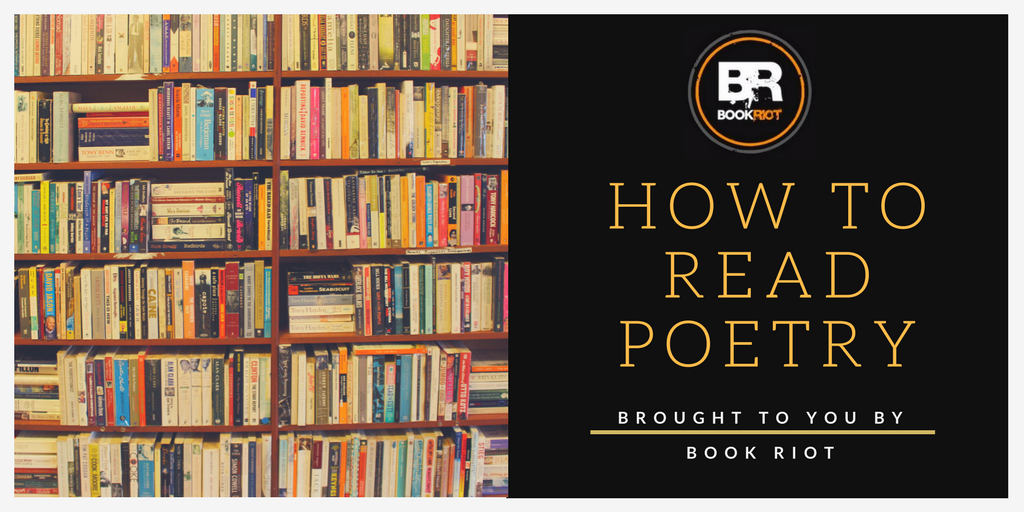April is National Poetry Month, and there are many ways to enjoy it while we’re staying at home. Spring can be a lovely time to add some poetry to your life, especially if you’re spending time outdoors and paying attention to the changes. The short form of poetry can also be comforting in uncertain times like these, when we may have difficulty focusing on something for longer periods of time. While brief, there is often a lot to mull over in a poem. It’s good to read a poem at least twice for comprehension and to appreciate the beauty or cleverness of it. The poem also wants you to read it out loud! As we live with more quiet and solitude, engaging with poetry might provide something we find that we want or need. Here are some ways to begin.
To Read:
In the digital collections offered by the library, there is a wonderful selection of poetry books you can read or listen to.

On Hoopla, there are plenty of poetry Ebooks and audiobooks to choose from, and there is also a more selective list of audiobooks for Poetry Month. On each list, you can filter for children’s titles on the left-hand side, but there are not very many. You can borrow items from Hoopla immediately and check out up to 10 things each month.

However, there is a lot for young people to read on
Overdrive/Libby, where you can now create an account without a library card number. You just need to sign up with your mobile phone number here or in the Libby app after downloading it onto your phone or tablet. There are amazing picture books, varied poetry collections, and novels-in-verse on the list for children, and the titles for teens include a variety of novels-in-verse for different readers and fabulous collections, too.
Here’s a favorite of mine from each list:
One Last Word: Wisdom from the Harlem Renaissance by Nikki Grimes

Blood Water Paint by Joy McCullough

For little ones, there are many picture books that include rhyme, imagination, or linguistic creativity. Oftentimes, books expose young children to sophisticated words in ways that stick. A good way to help promote early literacy is to name and describe the world around us, which is also a very poetic thing to do! If you are missing storytime like I am, this video of author Micha Archer performing an interactive reading of her picture book Daniel Finds A Poem will be a nice treat. She discusses the creation of the book at the end of the video, too.

To Explore:
The Academy of American Poets is an organization that offers so much to readers, poets, and educators. Much of it is available on their website, poets.org. On this page, you can also also sign up for one of their great email newsletters; the poem-a-day program sends a poem to your email inbox each day. In their materials for teachers, there are curated lists of poems that children or teens might enjoy. On the Poems for Kids page, there are poem lists for seasons, holidays, topics, and themes. The themed lists on the page for teens illustrates the breadth of serious things poets explore; Poems for Teens has lists for love, loss, breakups, mental health, heritage, politics, and the self. There is also great advice for young poets, recommended reading, and essays on writing here. Finally, there are ideas for celebrating National Poetry Month while practicing social distancing and communicating virtually here. I recommend creating an account so you can save poems you like online!

Book Riot also has many insightful, entertaining, and informational articles about all things related to poetry. You can find the current list here. These are two excellent places to start:
Where To Find Free Poetry Online
Where to Find Free Poetry Resources for Kids Online
To Write:
Please write if you find yourself inspired to do so. There are so many funny or strange ways to say how you view an infinite number of subjects in a poem, and you might surprise yourself by what you realize. Inspired by National Novel Writing Month in November, NaPoWriMo encourages people to write a poem every day in April. Every day of the month, there is a poetry-writing prompt, a featured submitted poem from the day before, and a unique poetry resource. Every post since 2013 is available on the website. For younger writers, the National Ambassador for Young People’s Literature, Jason Reynolds, has started a video series project to share writing prompts with young people each week. It’s called Write. Right. Rite. Although it’s not exclusively about poetry, Reynolds has written phenomenal poetry for young people and writes and speaks in a natural, rhythmic, and cool way. It’s how I imagine a lot of teenagers I know would write poetry.

I hope that there is something for you here and wish you safety and health until we can see each other at the library again.
